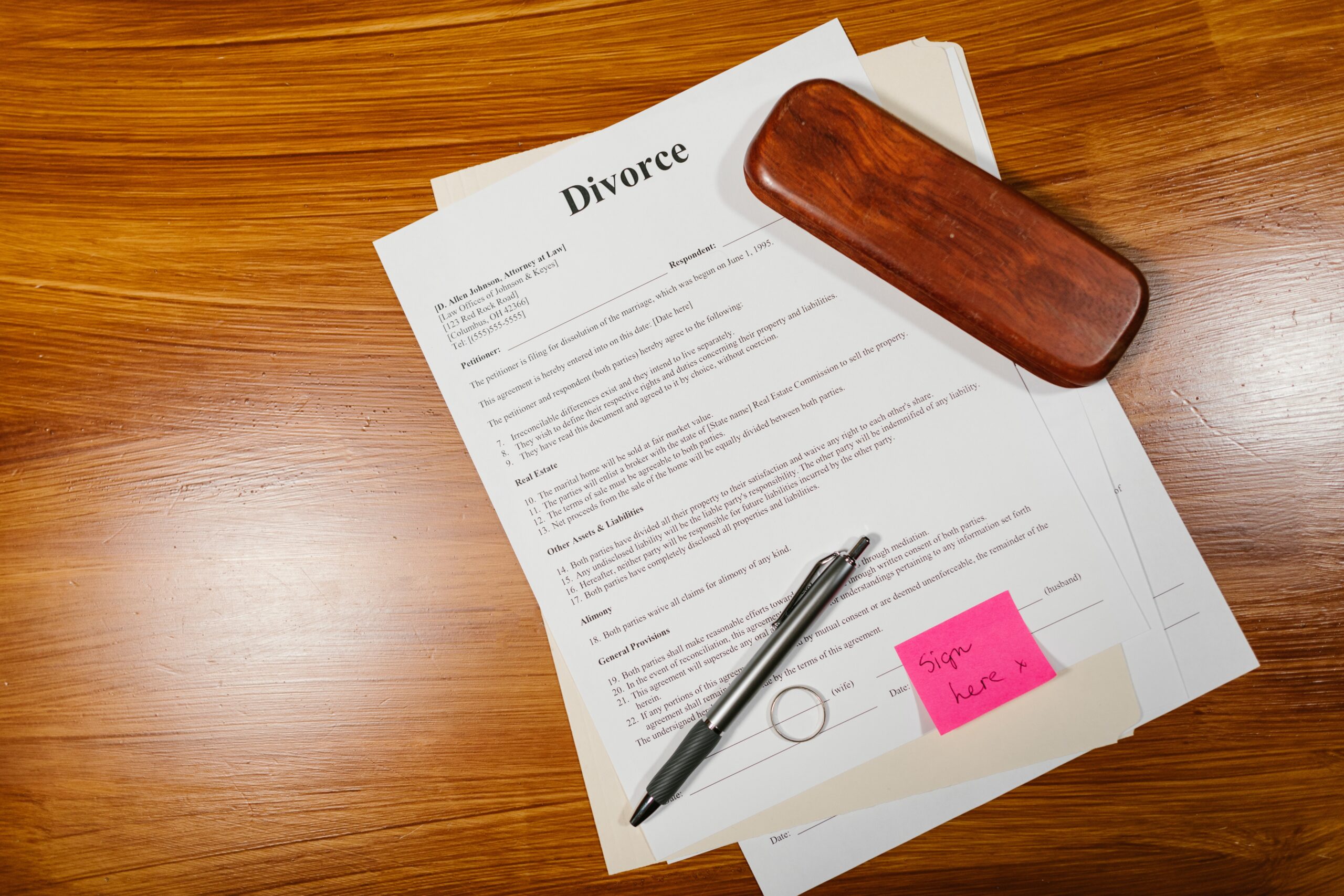
If you want a divorce without a lawyer, sometimes a fair, do-it-yourself divorce is possible.
Legally, you can handle almost any divorce proceeding by yourself. But in order to complete a DIY divorce that protects your interests and respects your rights, you need to be organized. More importantly, before you file, you need to understand that you’ll be expected to conduct yourself according to the same legal rules that an attorney has to follow, even if you don’t know those rules.
This is one reason why many people end up hiring an attorney for more complex divorces. However, divorces that are not contentious and that have few issues to resolve may be manageable for many couples who want to part without paying for an attorney. With that said, let’s look at what to consider when you file for divorce on your own.
What is DIY divorce?
You’re participating in a DIY divorce whenever you get divorced without an attorney. This means you may be doing some or all of the following by yourself, depending on whether you settle out of court or you go to trial.
- Preparing and filing all court paperwork (including petitions to initiate the divorce, subpoenas and motions)
- Having your spouse served with petitions, motions and subpoenas
- Gathering, reviewing, analyzing, organizing and presenting all evidence
- Scheduling evaluations and meetings with professionals (such as social workers, healthcare providers and financial experts)
- Examining and cross-examining witnesses
- Arguing your case before the court
- Negotiating and drafting separation and parenting agreements
- Speaking with your spouse or their attorney about divorce matters
Is DIY divorce right for you?
Every divorce and every divorcing couple is different. Still, if you want to initiate and finalize a divorce without an attorney, the process is typically easier if you get along with your spouse enough to come to a consensus on significant personal and financial issues. That’s because you’ll need to agree on how to handle all the following:
- Dividing marital property
- Dividing marital debts
- Spousal support
- Child support (if you share children)
- Child custody (if you share children)


Get the right lawyer for your divorce
Schedule a free 15-min call with our team today
How to start a DIY divorce
Before you file the paperwork for a divorce, if you wish to try the DIY route, you might want to take the following steps to prepare yourself:
- Review and organize your financial documents. As you do this, take inventory of your assets to determine what you need and what’s at stake.
- Make a list of your education and employment history. Courts make many of their divorce decisions based on each spouse’s ability to make a living, so completing a full review of your past and future earning potential may help you make the best arguments when requesting support or a larger share of the marital property.
- Make a list of your childcare and parenting needs. If you share children with your spouse, you might want to compile a file that includes your child’s schooling records, extracurricular records and medical history, as well as notes about any specific needs your child has. This can help you prepare to discuss and advocate for what’s in your child’s best interests.
- Talk to your spouse about your desire for a divorce. If your spouse doesn’t feel blindsided by your divorce petition, they might be more willing to work with you on the terms of the divorce. If you feel comfortable, you may also be able to start talking through some of the divorce issues with them, such as what kind of arrangement you want for your kids and how you want to divide your property.
Where to get DIY divorce forms
In a divorce, you often need paperwork that covers the following:
- Your initial divorce complaint or petition for divorce
- Proof of service or a waiver of service
- Disclosures of your assets and liabilities
- An agreement that outlines each party’s financial and parental rights and responsibilities
- A formal written decree of divorce that the court can sign
If you want to file DIY divorce papers, you can often find free forms on your court’s website. You can also call the court clerk or visit your court in person to obtain physical copies of the forms. Avoid using free forms from any non-government websites. These can be incomplete and may not address everything required by your state.
The DIY divorce process
The DIY divorce process is the same as the process for any divorce, except that you need to complete all the steps yourself instead of relying on an attorney.
Though the exact process may vary slightly depending on the details of your case, the outline below provides a general idea of what to expect in a DIY divorce.
1. File a divorce petition
The divorce petition is a legal document that, once filed, begins the divorce process. A petition for divorce (sometimes called a complaint for divorce or dissolution) includes basic information. This may include:
- Your name and current residence
- Your spouse’s name and current residence
- When and where you got married
- When you separated
- The names and ages of any children you share with your spouse
- Your grounds for divorce
- Any requests about child custody and visitation, child support, spousal support and property division
Once your petition and other paperwork is complete, you must file it in the right court. Only courts with jurisdiction over your divorce can accept and handle your filings.
The rules for jurisdiction depend on where you live and the facts of your case, such as whether you have shared children. Contact the court clerk to learn the jurisdiction rules for your case.
2. Pay filing fees
To file your initial divorce complaint, you need to pay a filing fee. The exact amount depends on where you file for divorce and the circumstances of your case. You can currently expect to pay a few hundred dollars to file for divorce.
If you can’t afford the filing fees, you typically have the option of asking the court to waive them. Your request might need to include financial documents and statements that reflect your monetary circumstances and are signed under penalty of perjury. (Meaning that, if anything is found to be untrue, you’ll be guilty of perjury and face consequences.)
3. Serve your spouse
After filing, you need to prepare a summons, which is a document that informs your spouse that you’ve filed for divorce. You then need to have your spouse personally served with the divorce complaint and summons.
To correctly complete personal service, you typically have to have one of the following individuals hand-deliver divorce papers to your spouse:
- A sheriff
- A professional process server
- Someone who is at least 18 and is not a party in your divorce case
In many cases, one of the individuals mentioned above needs to personally deliver your petition to:
- Your spouse
- A family member in your spouse’s home who’s at least 18
- Your spouse’s authorized representative
- A manager or assistant at your spouse’s workplace
Once your spouse is served, you usually have to submit an affidavit of service (filled out by the person who delivered the divorce documents) to the court.
Some states allow you to bypass personal service if your spouse signs a waiver of service. If your spouse waives personal service, you can send them your petition, a summons and a waiver by mail and file the waiver that your spouse signs. This might be appropriate if you and your spouse are preparing the divorce documents together. But keep in mind that the rules for service vary by state.
4. Attend court-mandated meetings
Some state courts require divorcing couples to take part in status conferences that review the steps a couple needs to take in their case. You may also need to participate in divorce mediation sessions that aim to help you resolve disputes before a trial becomes necessary.


Get the right lawyer for your divorce
Schedule a free 15-min call with our team today
5. Draft a detailed divorce agreement with your spouse
When you initiate a divorce, you and your spouse typically have three options:
- Submit a written agreement to the court that covers your plan for resolving all relevant divorce matters
- Submit a written agreement to the court that covers your plan for resolving some relevant divorce matters, and resolve the remaining matters in a divorce trial
- Take all your divorce issues to trial and let the judge decide how to resolve them
The court needs to approve the terms of any agreement to ensure it’s equitable and in the best interests of any children involved.
6. Go to trial
Not every DIY divorce can be finalized with an agreement between spouses. Some divorces have to go to trial. If this happens, you should be prepared to do the following:
- Identify and secure the attendance of the witnesses you need (such as accountants, family friends, healthcare providers and police officers)
- Question witnesses on the stand
- Lay a proper foundation for the evidence you present, which typically means asking witnesses the right questions and getting the right answers to prove that the evidence in your case is what you say it is
- Make proper objections to inappropriate evidence or questioning
- Respond to objections made by your spouse or their lawyer
- Make arguments in your favor
How an attorney can help
You can have success with a DIY divorce, but you might want to schedule an initial consultation with an attorney to get an idea of what to expect and what your needs will be. Getting a general roadmap from a divorce lawyer regarding what your divorce might look like may help you identify what kind of evidence you need to gather and what kind of paperwork you need to file.
And just because you start a divorce on your own, doesn’t mean you have to finalize a divorce by yourself. If you find surprise pitfalls during a split (for example, unexpected tax liabilities, division of more assets than you anticipated or challenging considerations regarding parenting rights), you can request attorney help at any time.
